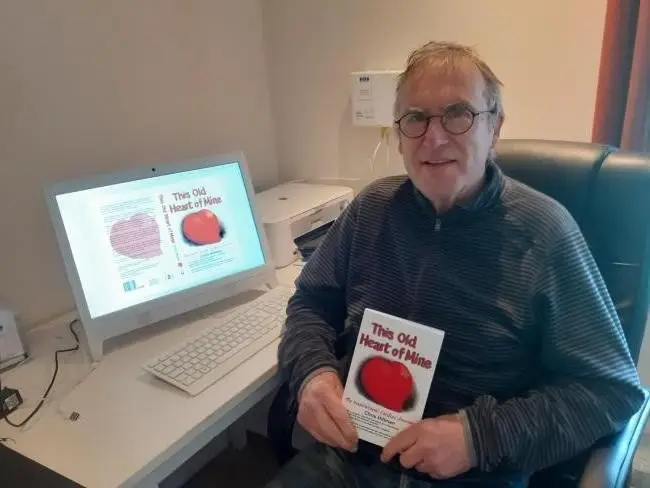Chris Hillman
Living with atrial fibrillation
United Kingdom

Like many cardiac patients, Chris Hillman could point to no particular symptom or reason to be undergoing double bypass surgery and a repair to one of his heart valves. Yet here he was on a January afternoon in a hospital room resembling a spacecraft with tubes and wires everywhere, about to start 2017 with a reconditioned heart.
At sixty-seven years of age, feeling relatively fit, and looking forward to many more years with his wife, Helen, and seven grandchildren, he wondered “is this the afternoon when the lights go out for good? Have I reached life’s final destination?”
One of the couple’s usual bike rides was a precursor to a major life change. “Oh well, Helen beat me, was my only thought when we got to the top of the hill, as I was puffing like a racehorse.” Three days later, during a routine check on arthritis, the doctor took Chris’ pulse and noted an irregular heartbeat. Two cardioversions – a practice that uses electrodes to send shocks to the heart – was unsuccessful in resetting his heart rhythm. Chris was then confirmed as having atrial fibrillation which can lead to blood clots, stroke, heart failure or death.
The ins and outs of the surgery itself were overwhelming but adequately explained, at least from a medical angle. On the other hand, Chris was unprepared for the accompanying emotional reactions including fear, apprehension, and anxiety which worsened over time and post-operation. These emotions were not discussed during the consultation, leaving him unsure if he was uniquely impacted. Should a medical team include someone to offer this level of support and comfort? Is it realistic to expect emotional support? Chris believes that the cardiac patient journey has three clearly defined phases: pre-procedure, procedure and hospitalisation, and post-procedure that includes home care.
It sounds strange to hear Chris say he wants to show that having heart disease can have a massive upside. But he knows what he is talking about. He is determined to ensure that the emotional and psychological difficulties of major surgery become part of the patient’s care pathway. Since his recovery, he has met and interviewed other heart patients, been uplifted by stories of a man who led a previously sedentary lifestyle and who now runs marathons in the Saharan Desert, and himself served as a support and resource for others.
Chris laments the absence of a support system such as “Buddy Beat” that he wants to get up and running with partners, donors and medical experts and has been drawing up a plan for a professional mentoring programme. But he isn’t waiting around until it is fully fledged: he has already been meeting with patients in his community in northern England, who like himself years ago, want to talk with someone who has travelled the same road.
“Having someone to share that journey with you who knows what you are experiencing is something I wish was available to me. Having a buddy available 24/7 would be a support mechanism that does not yet exist within the cardiac system. Buddy Beat will improve the patient’s pathway and offer a comforting voice when post-recovery gives way to sadness and worry,” explains Chris.
The first patient to ever to have acquired a two-year access “all areas pass” to a world-class cardiac centre, Chris wrote the book “This Old Heart of Mine – My Inspirational Cardiac Journey.” He is now on a mission to create a central resource that delivers comprehensive information that cannot always be covered in time-limited clinical consultations: honed and vetted content on a virtual hub featuring motivational stories, goal–setting, emotional and psychological support, clinician access, education, a buddy system and all the resources a cardiac patient may wish to access on their life-changing journey.
“The occasional useful websites are available but where are they and how do you locate them is the patient‘s challenge– finding the most credible information, a curated hub instead of Dr. Google and a million search results.”
Cardiovascular disease is the leading cause of death, claiming more than 18 million lives annually. Prevention, treatment and everyone having access to care are vital yet remain elusive in many places.
“I still worry. After all, heart surgery is literally tinkering with your lifeblood and every tweak and murmur makes me extra alert. It also keeps my passion alive to someday make the patient’s journey less traumatic and more promising.
While I am still on this Earth, I want to have some influence in developing a better patient pathway that considers the emotional and psychological weight of a cardiac diagnosis,” Chris says as he continues relentless research and networking with some of the world’s leading care groups.
Chris Hillman is a cardiac patient at the Lancashire Cardiac Centre. Over a 40–year career in management development, he has partnered with many iconic brands in more than 30 locations around the world. He wants to help fellow cardiac patients acquire the best physical and mental outcomes possible from their cardiac journey and is a proud WHF Heart Hero.
Chris would welcome hearing from any interested party about getting involved with the project: chrishillman2014@gmail.com